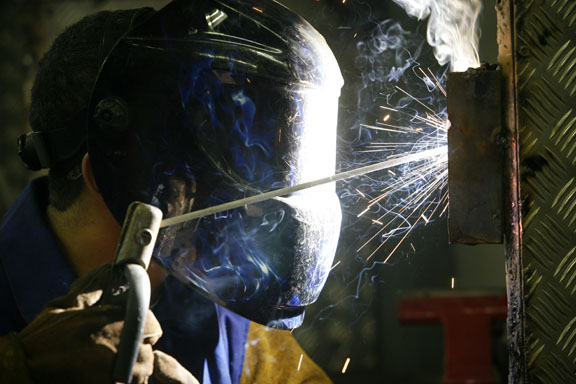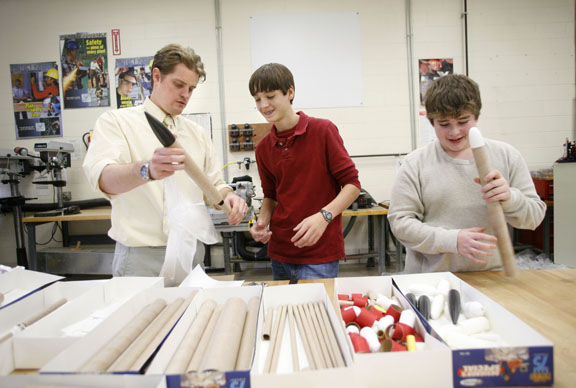
Sophomore Tevon Clay vertical-up welds during Randy Shewmaker’s class at the Franklin County Career and Technical Center Dec. 1, 2010. Photo by Amy Wallot
By Susan Riddell
susan.riddell@education.ky.gov
The Franklin County Career and Technical Center (FCCTC) is housed in a building that was previously known as the vocational school 20 years ago.
It “was thought of as a place where the non-academic students should go to learn a trade for work because they would never go to college,” said Randy Shewmaker, welding instructor.
“Now, any and every student who would like to learn a skill or a trade, and/or go to college, can and does attend.
“That is the beauty of a career and technical center,” he added. “Students are provided with hands-on instruction in a career pathway that can lead them to a successful postsecondary avenue, whether it is the college level, the work force or the military. Every teacher and program at FCCTC also delivers instruction specifically focused on workplace skills, safety and health, communication and teamwork, and problem-solving skills. The students receive a well-rounded, career-oriented education with hands-on experience while attending the Career and Technical Center (CTC).”
Shewmaker, a certified welder, welding engineer and instructor, has been at FCCTC for seven years. His work, along with other staff members’, has helped FCCTC be successful in not only sending students to college but doing so with both experience and college credit.
“Most of our programs offer college credit,” said Mark Harrell, pre-engineering teacher at the school. “My pre-engineering program offers college credit at more than 30 colleges and universities across the nation, including the University of Kentucky. This college credit is possible because of our affiliation with Project Lead The Way. We are also finalizing an agreement with Bluegrass Community and Technical College to offer dual credit.”
More than 700 students in the Franklin County school district take at least one class at FCCTC, including students from Franklin County and Western Hills high schools and The Academy, an alternative school in the district.
“All programs at our tech center offer real-world skills that students need to be successful,” Harrell said. “Our students have a reason to learn our concepts because there is real-world application. We are also a very hands-on learning environment, which most students enjoy. We are teaching skills that the future of America needs to succeed, and the students understand this. Every day in my lab students understand why they have to learn a concept and how engineers would use the same concept in the real world.”
Students also have the opportunity to receive industry-based certifications in their chosen career path, Shewmaker said.
“Each program has an advisory committee that consists of parents, students, business and industry partners, teachers, and postsecondary staff,” said Shewmaker, who teaches five welding classes and has about 20 students per class. “These committees guide our programs in the direction that the work force is now as well as for the future. This group shares information regarding what the industry/workplace needs are and specific skills and areas that are necessary for students to achieve.”
Programs at the career and technical center offer learning for those interested in pre-engineering, welding, construction/carpentry, auto mechanics, health science and information technology.
Construction/carpentry, auto mechanics and information technology classes are very popular at FCCTC, with high enrollment numbers, while health science classes have the most students.
“(Principal) Karen Schneider has transformed our image from vocational-tech into a college prep/career center,” said Harrell, who has taught at FCCTC for five years. “Some of my students will leave high school with 16 college-credit hours just from my courses. Our students are better prepared for the real world because they have already lived it through our programs.”
FCCTC teachers routinely collaborate with those at Franklin County High.
“Math, reading and writing content are integrated into all six program areas of the CTC,” Shewmaker said. “Math and science content (together) is integrated within our pre-engineering and health science programs.”
Franklin County High mathematics teacher Lara Mason teaches FCCTC’s Digital Electronics class.
“She does an excellent job at relating the electronics field to math concepts,” Harrell said. “The students really see a connection. We also hope that this Digital Electronics course will count as a math elective next year. This will draw more math/science career majors to our program.”
Both Harrell and Shewmaker’s students have had success in student competitions the last several years. For Harrell, Project Lead The Way has been a big reason why.
“Our tech center has been affiliated with PLTW since 2002,” he said. “I took over the program in 2006, and we became a certified PLTW school in 2008. Becoming a certified school is how we are able to offer college credit to our students. PLTW’s curriculum is a comprehensive curriculum emphasizing critical thinking, creativity, innovation and real-world problem solving.
“Each course curricula represents a complete package, which allows the instructor to focus on teaching, student achievement, assessment and professional development,” Harrell added. “The hands-on, project-based program engages students on multiple levels, exposes them to subjects that they typically would not pursue, provides them with a strong foundation for achieving their academic goals in any chosen field of study and, if pursued, establishes a proven path to college and career success in STEM (science, technology, engineering, mathematics) industries.”
Harrell said he has slightly more than 100 students this year in his pre-engineering classes, and he expects that number to increase next year with the addition of the Gateway to Technology Middle School program, which will be offered at neighboring Elkhorn Middle School.
Elkhorn Middle teacher Julia Stephens “will bring in the science concepts from her background to help students bridge that gap,” Harrell said. “We also are piloting a 5th-grade program at Elkhorn Elementary (School) in which 5th graders will be learning engineering concepts through a hands-on PLTW/NASA curriculum.”

Teacher Mark Harrell, left, helps freshman Thomas Stone, center, and Chris Talley choose pieces for their rockets during Introduction to Engineering Design at the Franklin County Career and Technical Center Dec. 1, 2010. Photo by Amy Wallot
Enrollment numbers for Shewmaker’s welding classes also are likely to increase in the coming years.
“Welding is such a broad program now in terms of the level of the worker and technical field that exists,” Shewmaker said. “One can go into the field as a traditional welder or become a welding engineer. Welding is a very diversified and highly skilled career that is pursued by not only the non-traditional student, such as females, but anyone else who is willing to work hard and be determined to succeed.
“Last year my students received more than $40,000 in welding scholarships,” Shewmaker added. “The job market for welding is at its highest ever. The American Welding Society forecasts that by next year there will be 200,000 welding jobs available in the U.S.”
MORE INFO …
Karen Schneider, karen.schneider@franklin.kyschools.us, (502) 695-6790









Leave A Comment